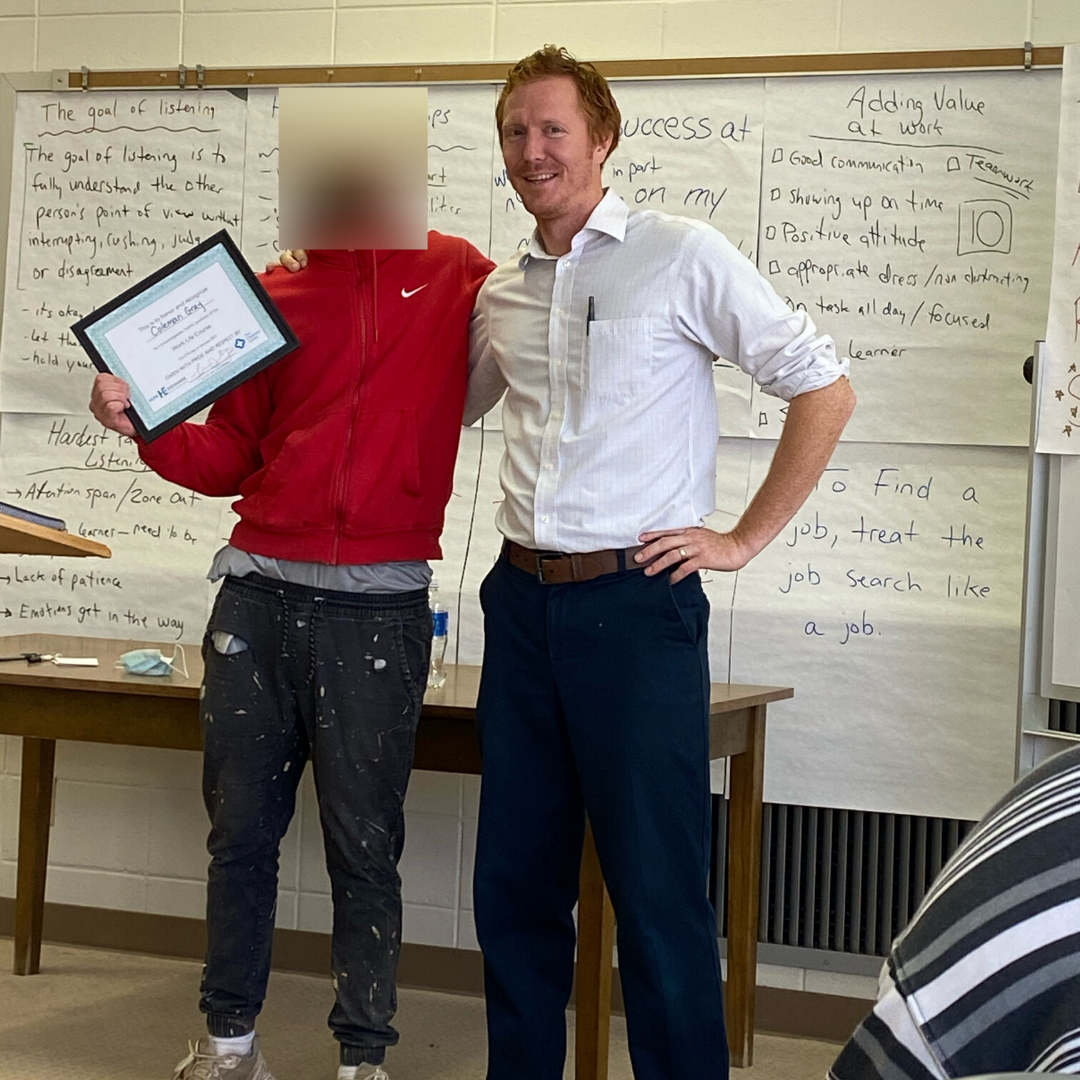At Sunnybrook, you will find a classroom filled with sheets of paper taped to the walls, each one written on with different colored sharpies and post-it notes. This is the classroom where Sunnybrook residents come weekly to participate in two courses: Work Life and Faith & Finance. Levi Gill, the instructor for both of the classes, started teaching them at Sunnybrook last September.
Levi and his wife Kateri started a ministry called Hope Exchange four years ago through Redeemer Church in Jackson, MS. Its mission is clear: to equip the church and its people with tools to combat poverty and socioeconomic injustice in the city. Hope Exchange exists to “help people who experience material poverty thrive in their work and their finances, and with that connect people to quality employment,” says Gill. In addition, within the church, “it helps members learn how to posture themselves to walk alongside people from generational poverty so that the church can be a healthy, diverse space.”
The courses taught by Gill are modeled by the Chalmers Center, a ministry that provides tools to local churches who want to empower the poor by giving them the resources for lasting transformation in their work and relationships. The courses are not lectures; rather, they are facilitated conversations.

Work Life and Faith & Finances are based on a biblical perspective. The classes have two key themes: One, Jesus is making all things new, including our money and relationships. Two, God has chosen to use our money to accomplish His work in the world. Levi says that while people do not have to be Christian to take part in the classes, he feels that they are a great evangelistic tool and an introduction to the God they’re being asked to know.
Work Life
The Work Life course focuses on job-preparedness and teaches the skills for not just getting a job, but how to keep a job. From a biblical perspective, the class begs its participants to question: Why did God make work to begin with, and how does that connect with his design for human flourishing? Humans are designed to work; we don’t feel good if we’re not working—why is that?
There are 19 units in the class and it centers on four key relationships: God, ourselves, others, and the rest of creation. Participants learn both soft and practical skills as it relates to their work and how to be a good steward of their time and talents. The course often introduces tough, sometimes uncomfortable questions about socioeconomic injustice in the workforce. For example, why is it fair that people who have the opportunity to get a better education make more money? Why do managers make more money than their employees who work harder and longer hours?
Is there injustice in the workforce? “Yes,” says Gill, “but you need to know how it works so that you can climb the channels that are available to you.”
In addition to learning effective communication and conflict management in the workplace, participants leave the class with the basics for getting a job, including a resume, cover letter, and mock interview practice. Along with the facilitated conversations that take place within the classroom, Sunnybrook residents also take their class out into the community where they may go plant a tree for a neighbor, bust up concrete on campus, or mow the lawn at the nearby baseball field.

Two Sunnybrook residents recently graduated from Work Life. Sunnybrook staff and residents held a graduation ceremony for the two young men, “C” and “L”. “C” and “L” grew in their ability to present themselves professionally in the nineteen weeks that they participated in the class. Pictured on the right is Levi and Sunnybrook resident, “C.”
Faith & Finance
Levi defines Faith and Finance as “basic financial literacy designed for people who grew up in generational poverty.” Rather than speaking from the perspective of an average, middle-class worker, the curriculum stays relevant to the language of people who grew up in poverty. Lessons involve following scenarios in which participants can relate to, such as people who struggle to make ends meet and who speak to the same realities that the participants face. Because a distrust of institutions often exists in people who come from generational poverty, the course seeks to address those issues by, for example, inviting a representative from a local bank to the class.
The curriculum consists of twelve units and addresses everything from how money affects relationships to how to manage your money in times of emergency. Participants also learn how to track their income and expenses, and are held accountable for keeping up with their records.
Levi has created a classroom environment that is inclusive to all walks of life. While the curriculum is designed for people who come from poverty, it is informative for anyone who is interested in learning more about job-preparedness and how to manage their finances. It is also a place of discipleship. No question is uneducated, and no story that wants to be shared isn’t heard.
When asked if he has been personally impacted by teaching at Sunnybrook, Levi said, “being able to walk alongside this age group is neat… it’s exciting to me to work with this particular age group that’s often underserved. You’re mining for gold and you have to get through some rough places to get there, but it’s there. I see the gifts that God has placed in these individuals. God is able to take whatever things are standing against you and work it in such a way that you can come out productive and helpful to society.”
One of the difficult parts about addressing socioeconomic injustice is learning when helping is hurting. As Christians and members of society, we have an obligation to share our resources with people in need. However, if there is no personal development occurring, enough isn’t being done to remove that person from the cycle of poverty. That is why investing in the personal and professional development of people, like the work of Hope Exchange, matters. With the right tools and support, people have a chance to create lasting change. The change will be slow. There will be setbacks, but there will also be healing.
In Levi’s words, “we want to equip you with the skills so that you don’t just survive, but that you give back and that you be a vital part of the community. Because you are.”
The Hope Exchange Community Group meets on Wednesday nights at Redeemer Church in Jackson, MS. It is open to anyone who wants to participate. To learn more about the Hope Exchange ministry, visit https://redeemerjackson.com/get-involved/outreach/hope-exchange/.

